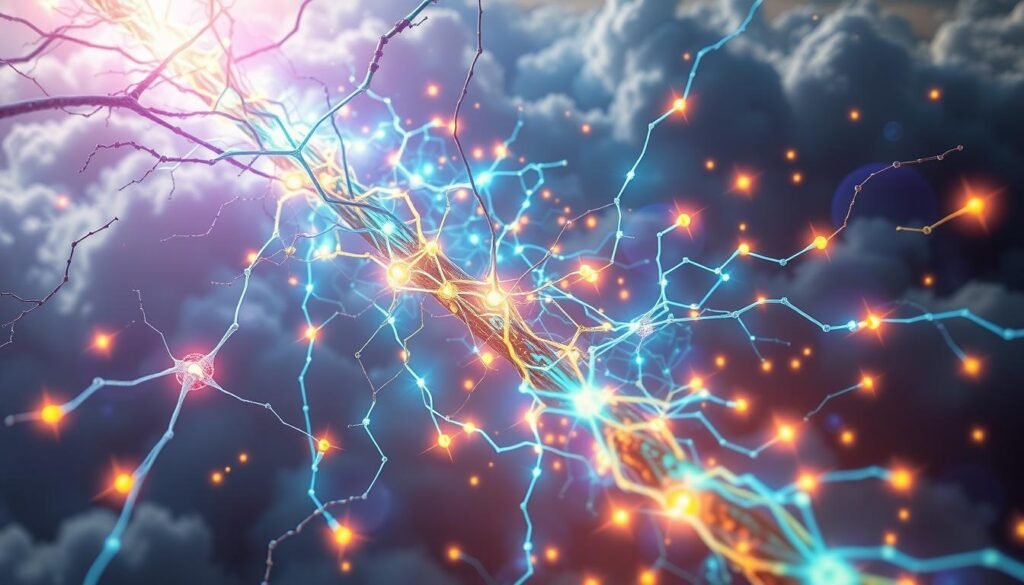Did you know about one-third of people with depression don’t get better with usual meds? This fact shows we need new ways to help. Ketamine therapy is this new help. It’s not just for putting people to sleep anymore.
Now, it’s a fast way to ease deep sadness. It can work in hours, not like old pills that take weeks. Studies say ketamine helps those who felt hopeless. They now have a chance to feel better quickly.
Key Takeaways
- Approximately one-third of individuals with depression are resistant to standard treatments.
- Ketamine therapy can reduce depressive symptoms within hours.
- This therapy shows promise for patients with treatment-resistant depression.
- Ketamine’s potential is backed by promising research findings.
- Ketamines rapid effects contrast sharply with traditional antidepressant timelines.
- There is an increased focus on safety and tolerability in recent clinical studies.
Understanding Depression and Its Challenges
Depression is more than just being sad. It’s a complex mental condition that takes away the joy from activities you used to love. People with depression face a lot of challenges. They might feel tired all the time, sleep poorly, and find it hard to focus. It affects how you feel, think, and handle daily activities, making everything harder. Knowing about depression is the first step to helping someone fight it.
Definition of Depression
Depression is a common but serious mood disorder. It deeply affects how you feel, making it hard to function well. People with depression may feel worthless and struggle to connect with others. These feelings are more than a temporary bad mood. Depression can last for a long time, adding to the person’s stress.
Types of Depression
It’s important to know there are different types of depression. Understanding these can help find the best way to treat them. Types include:
- Major Depressive Disorder: Severe symptoms that disrupt daily life.
- Bipolar Disorder: Cycles of depression and high moods.
- Persistent Depressive Disorder: Long-term depression.
Each type of depression has its own set of symptoms. Knowing this helps doctors give the right diagnosis. For more information on treatments, see this source.
Impact on Daily Life
Depression changes how you function every day. It can make simple tasks feel overwhelming. This can lead to feeling isolates and puts stress on everyone around. Understanding and supporting someone with depression is vital. It helps them feel less alone and can lead to effective care.
The Rise of Treatment-Resistant Depression
Treatment-resistant depression (TRD) is a huge issue for people with chronic depression. It doesn’t improve after trying at least two antidepressant treatments. This leaves patients feeling lost and without hope. About one-third of people with major depression deal with this resistance. It shows the need for new treatments, like ketamine therapy.
What is Treatment-Resistant Depression?
TRD is a severe kind of chronic depression. In this case, usual treatments don’t help. Those with TRD face ongoing symptoms that make daily life tough and harm their well-being. The growth of TRD shows we must look beyond standard antidepressants for new treatments.
Statistics and Prevalence
Depression impacts about 21 million U.S. adults, with TRD making up 10-20% of these cases. TRD affects more than 1% of people, making up about 30% of those hard to treat with usual methods. This problem is a major public health issue and a leading cause of disability worldwide.
Limitations of Traditional Antidepressants
Regular antidepressants have key drawbacks. They often work slowly and come with various side effects. For many, these medications take too long to work and have negative effects that make them stop taking them. Unlike quick-action treatments like ketamine, traditional antidepressants’ slow effect is a big issue for those in deep depression. This explains the interest in other treatment possibilities.

The Mechanism of Ketamine: A Different Approach
Ketamine is shedding new light in the battle against depression. It tackles the problem differently compared to standard antidepressants. While most act on the body’s monoamine pathways, ketamine targets the glutamatergic system. This makes it a fast-acting solution for those struggling with severe mood disorders.
How Ketamine Works in the Brain
Ketamine works by blocking NMDA receptors, important for glutamate signals in the brain. This blockage leads to a boost in glutamate levels. Glutamate is vital for brain activity and this increase improves brain connections. This quickens changes in mood and thought processes.
The Role of Glutamate and NMDA Receptors
Glutamate’s role doesn’t stop with quick signals. More action at NMDA receptors aids in creating new brain connections, a process called neurogenesis. Studies show that this is why ketamine can quickly help improve mental health. For more details on how this works, especially in tough cases, you can check out this research.

Ketamine Depression Therapy: The Breakthrough
Ketamine therapy is a big change in treating depression, especially for those whom other treatments didn’t help. The way it’s given is very important, with IV and nasal spray being top methods.
Intravenous Infusion vs. Nasal Spray
IV and nasal spray ketamine both have their own advantages. IV gives a controlled dose, allowing for exact drug delivery. It’s well-researched and works fast. The nasal spray, or esketamine, lets patients get treatment easily, even at home. It makes getting better more comfortable.
Rapid-Acting Antidepressant Effects
Ketamine works fast compared to usual antidepressants, which can take weeks. About 70% of people feel much better after just one session. Its quick action is very helpful for those who need urgent help, offering quick relief from depression.
| Administration Method | Onset of Action | Dosage Control | Convenience |
|---|---|---|---|
| Intravenous Infusion | Hours | Highly Controlled | Requires Office Visit |
| Nasal Spray (Esketamine) | Hours | Moderately Controlled | At-Home Use Possible |
Ketamine therapy brings new hope to those with depression. It introduces new treatment ways that could change mental health care.
Esketamine: An Evolution in Treatment
Esketamine is a big step forward in treating depression, especially after its FDA approval in 2019. This approval shows its importance as a treatment innovation for those with tough depression cases. It points out the urgent need for new mental health treatments. This change is big in how we deal with such issues.
FDA Approval and Its Significance
Esketamine’s approval is a big deal. It’s the first really new type of antidepressant since the 1960s. It opens the door for new ways to treat depression. Studies show its effectiveness. After six months of use, patients saw great improvement.
They felt much better, with their scores dropping significantly. This shows esketamine’s power in fighting severe depression.
How Esketamine is Administered
Esketamine is given in a safe clinical setting. This ensures patient safety by keeping an eye on any side effects. It’s used with other antidepressants, which improves results. This approach adds an extra layer of safety.
Studies say esketamine helps more than some other medicines. It works as well as ECT for hard cases. This makes it a strong option for those tough to treat.

After a month of treatment, fewer patients feel strongly suicidal. In fact, the number dropped significantly. No serious side effects were seen, making it a hopeful choice. This progress in treatment brings hope and shows the need for ongoing research. To learn more about esketamine, click here.
Research and Clinical Trials on Ketamine
Ketamine research has advanced a lot, especially for those who struggle with depression. Many studies have shown how ketamine and esketamine could help individuals who haven’t been helped by other treatments.
Key Findings and Success Rates
Studies show ketamine has real benefits. About 71% of people in trials felt better after ketamine shots. Half of the patients saw improvements. Moreover, if the first treatment worked, chances are high the next ones will too.
In 2019, the FDA said yes to esketamine for tough cases of depression. Esketamine nasal spray works fast and keeps symptoms at bay for two months with follow-up doses. A big study is now looking at esketamine spray versus ketamine IV, involving 400 people in the US.
| Study or Trial | Participants | Success Rate | Comments |
|---|---|---|---|
| Bio-K Study | 74 | 52% achieved remission | 80% reported suicidality |
| Stanford Medicine Trial | 40 | Significant improvement observed | Scores dropped by 50% |
Challenges and Side Effects of Ketamine Treatment
Ketamine offers hope, but it’s not without its issues. Side effects like feeling disconnected, high blood pressure, and the risk of misuse are serious concerns. Doctors and patients must think about these. They are working to make it safer by finding the best doses and adding counseling.
This way, they aim to improve results. The hunt for better ways to use ketamine with fewer risks is ongoing.
Potential for Ketamine in Wider Mental Health Treatments
Studies are exploring new uses for ketamine beyond depression treatment. Researchers are now looking at how ketamine might help with anxiety and PTSD. This could change how we treat mental health. Ketamine’s new forms, like RR-HNK, might be safer and more effective. They could avoid the side effects common with regular ketamine treatments.
Future Research Directions
Research aims to understand how ketamine helps with mental health. Key focus areas include:
- Identifying biological markers that match how patients react to ketamine.
- Exploring the best doses and ways to give ketamine for the most benefit and least risk.
- Looking at how ketamine treatments can prevent suicide over the long term.
- Finding out if ketamine can help avoid relapse and when to give ongoing doses.
Combining Ketamine with Other Therapies
There’s growing interest in using ketamine with other treatments, like psychotherapy. This can help with mental health by tackling both brain and behavior issues. Mixing treatments might lead to better and lasting recovery for patients. For more on ketamine’s benefits and how it can be used, check this systematic review. It covers the strong anti-depressant effects of ketamine and ideas for support.
Real-Life Experiences with Ketamine Therapy
Many people fighting mental health issues have turned to ketamine therapy for help. They went through a series of ketamine infusions. As a result, their lives changed for the better. This treatment reduced their depression symptoms and improved their ability to do everyday activities. Thanks to the therapy, they could do things like cook, clean, and hang out with friends again.
Patient Testimonials
People who’ve tried ketamine therapy share amazing stories. One study showed a 70.8% success rate after six infusions. Patients went from battling severe depression to only mild symptoms. This shows how effective ketamine can be. Even those who didn’t feel better at first saw a decrease in suicidal thoughts. Apart from infusions, patients also found relief using troches. These offered extended help during tough times.
Expert Opinions on Effectiveness
Mental health experts praise ketamine therapy for its quick results and innovation. They note it’s great for those with hard-to-treat depression and other mental health disorders. With more ketamine clinics opening and FDA backing for anesthetic use, its off-label use in depression treatment is growing. Experts suggest mixing it with other treatments for even better results. Continuing research is key to refining its use and understanding its long-term benefits.
| Outcome | Before Therapy | After Therapy |
|---|---|---|
| Depression Severity | Severe | Mild |
| Response Rate | N/A | 70.8% |
| Improvement in Daily Activities | Limited | Enhanced |
| Decrease in Suicidal Ideation | Present | Absent |
| Usage of Supplements (Troches) | N/A | Supplementary |
Conclusion
Ketamine’s rise as a depression treatment marks a big change in mental health care. This is especially true for people with treatment-resistant depression. It works fast and shows major improvements, offering hope to those who have tried everything else. Studies show ketamine therapy quickly boosts mood and reduces thoughts of suicide, unlike traditional treatments that take longer to work.
As more research on ketamine therapy comes out, it seems mental health care might focus more on quick-acting treatments. Clinical trials have shown great results, like better depression scores and higher response rates in patients. This points to a need for more study and use of ketamine in mental health care. It suggests we’re moving towards a new phase in treating mental health issues.
Yet, using ketamine over the long term and its possible side effects are concerns. Still, its effectiveness in dealing with hard-to-treat depression is clear. The outlook for mental health treatment is promising as new strategies are adopted. These innovations mean better results and hope for those fighting depression.